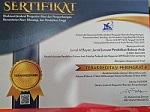Arabic Phoneme Learning Challenges for Madurese Students and the Solutions
Abstract
Keywords
Full Text:
PDFReferences
Algabri, Mohammed, Hassan Mathkour, Mohamed Abdelkader Bencherif, Mansour Alsulaiman, and Mohamed Amine Mekhtiche. "Towards Deep Object Detection Techniques for Phoneme Recognition." IEEE Access 8, (2020): 54663–54680.
Arifandi, Fathoni. "Dialek Madura pada Tindak Tutur Mahasiswa Bahasa Arab di Jember," International Conference of Students on Arabic Language 5, (2021).
Baniata, Laith H., Seyoung Park, and Seong-Bae Park. "A Neural Machine Translation Model for Arabic Dialects That Utilizes Multitask Learning (MTL)." Computational Intelligence and Neuroscience 2018, (2018).
Creswell, John W., and J. David Creswell. Research Design: Qualitative, Quantitative, and Mixed Methods Approaches. Sage Publications, 2017.
Ellis, Nick C, "Essentials of a Theory of Language Cognition," The Modern Language Journal 103, (2019), 39–60.
Fudhaili, Achmad. "Stratijiyat Talim al-Aswat al-'Arabiyyah fi Jam'ah al-Naqayah li al-'Ulum al-Islamiyyah wa Jami'ah al-Amin li al-Dirasat al-Islamiyyah Madura." Doctoral Dissertation, Universitas Islam Negeri Maulana Malik Ibrahim, 2020.
Harahap, Andi Sahputra. "Bahasa Arab, Asal Usulnya, Faktor yang Mempengaruhi Perkembangannya dan Karakteristiknya," Hukumah: Jurnal Hukum Islam 4, no. 2 (2021).
Jaber, Jad. "Arab Queer Language: What Are the Characteristics of the Language Used Upon, and Within Queer Arab Culture, and How Does That Affect the Identity-Formation and Subjectivity of Queer Arab Individuals?.’ Institute for Women’s Studies in the Arab World. Retrieved from Https://Aiw. Lau. Edu. Lb/Files/Arab-Queer-Language. Pdf, 2018.
Lian, Bukman. "Tanggung Jawab Tridharma Perguruan Tinggi Menjawab Kebutuhan Masyarakat." Prosiding Seminar Nasional Program Pascasarjana Universitas PGRI Palembang (2019).
Lulu, Leena, and Ashraf Elnagar. "Automatic Arabic Dialect Classification Using Deep Learning Models." Procedia Computer Science 142, (2018): 262–269.
Malla, Agussalim Beddu. "al-Tafkir al-Sauti 'inda al-'Arab bayna al-Qadim wa al-Hadis." Nady Al-Adab: Jurnal Bahasa Arab 17, no. 2 (2020): 26–30.
Maraoui, Mohsen, Naim Terbeh, and Mounir Zrigui. "Arabic Discourse Analysis Based on Acoustic, Prosodic and Phonetic Modeling: Elocution Evaluation, Speech Classification and Pathological Speech Correction." International Journal of Speech Technology 21, no. 4 (2018): 1071–1090.
McLeod, Sharynne, and Kathryn Crowe. "Children’s Consonant Acquisition in 27 Languages: A Cross-Linguistic Review." American Journal of Speech-Language Pathology 27, no. 4 (2018): 1546–1571.
Mubarak, Husni. "Asal Usul Bahasa Arab." Jurnal Ilmiah Iqra’ 5, no. 1 (2018).
Nasaruddin, Nasaruddin. "Al-Ashwat Al-Árabiyyah Al-Sha’bah Wa Ta’limuha Li Al-Nathiqin Bi Al-Lughah Al-Indunisiyyah." Arabiyatuna: Jurnal Bahasa Arab 6, no. 1 (2022): 1–24.
Rina, Ghata, and Mila Karmila. "Pendidikan Keterampilan Hidup (Life Skill) Anak Usia Dini Selama Masa Pandemi Covid-19 Di Lingkungan Keluarga." Tematik 6, no. 2 (2020): 53–61.
Schiff, Rachel, and Elinor Saiegh-Haddad. "Development and Relationships between Phonological Awareness, Morphological Awareness and Word Reading in Spoken and Standard Arabic." Frontiers in Psychology 9, (2018): 356.
Seelawi, Haitham, Ibraheem Tuffaha, Mahmoud Gzawi, Wael Farhan, Bashar Talafha, Riham Badawi, and others. "Alue: Arabic Language Understanding Evaluation." Proceedings of the Sixth Arabic Natural Language Processing Workshop (2021): 173–184.
DOI: http://dx.doi.org/10.24042/albayan.v15i2.15837
Refbacks
- There are currently no refbacks.
Copyright (c) 2023 Jurnal Al Bayan: Jurnal Jurusan Pendidikan Bahasa Arab
License URL: https://creativecommons.org/licenses/by-nc-sa/4.0
Editorial Office:
Jurnal Al Bayan: Jurnal Jurusan Pendidikan Bahasa Arab, Arabic Education Study Program, Faculty of Education and Teachers Training, Unversitas Islam Negeri Raden Intan Lampung
Jl. Endro Suratmin 1 Sukarame, Bandar Lampung 35131-Indonesia
e-mail: jurnalalbayan@radenintan.ac.id
http://ejournal.radenintan.ac.id/index.php/albayan/index
Jurnal Al Bayan: Jurnal Jurusan Pendidikan Bahasa Arab is licensed under a Creative Commons Attribution-ShareAlike 4.0 International License. p-ISSN 2086-9282 | e-ISSN 2549-1229









